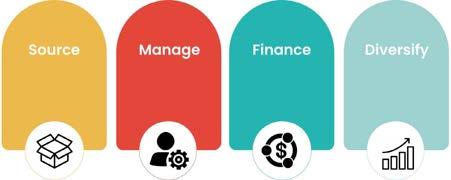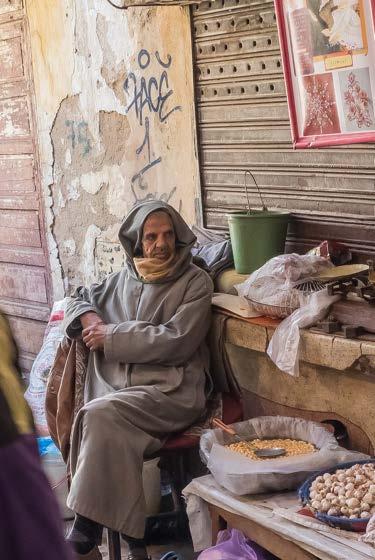
15 minute read
RETAIL FEATURE DIGITISATION
Ghana institute unveils banking customer satisfaction index for 2021
CIMG also discusses ambitious strategy for additional customer satisfaction and branding studies taking place during 2022.
THE CHARTERED INSTITUTE of Marketing, Ghana (CIMG) recently unveiled the Ghana Customer Satisfaction Index (CIMG-CSI Report, 2021), dubbed “The CoffeeTable Publication”.
A launch event was held at the Coconut Grove Hotel in Accra and attracted a live audience and around 100 virtual attendees.
The Coffee-Table Publication of the CIMG-CSI Report, 2021 is the culmination of a well-researched customer satisfaction survey which was conducted last year. It involved 23 universal banks in Ghana, under the auspices of the Bank of Ghana and Ghana Association of Banks.
In his opening address the National President of the CIMG, Dr Daniel Kasser Tee said, “As we launch this report, I urge the banks to study it seriously and tighten up on all the areas where their performances fell short of the expectations of their customers. We are available, as an institute, to provide the needed hand-holding to enable all of you to bring up the quality of services you render to customers.”
INFORMATION TO SHAPE LOCAL BUSINESSES
The Chief Executive Officer of the McDan Group of Companies and Chairman for the occasion, Dr Daniel McKorley, expressed his interest in the research projects, indicating that they are “customer-centric and a viable source of information to help shape businesses”. Dr McKorley announced support of GHS250,000 (US$31,000) from the McDan Group of Companies, which will go towards the CIMG’s next round of research projects.
Launching the CIMG-CSI report, 2021 was Ms Sandra Thompson, Secretary of the Bank of Ghana, who represented the central bank Governor.
She indicated that the management of the central bank was very pleased with the maiden research work initiated by the CIMG last year. She was hopeful that banks would see the report as a useful tool to help them improve service quality across all their operations.
ADDITIONAL CIMG RESEARCH PROJECTS COMMISSIONED
The event also witnessed the commissioning of two research projects for 2022. The first being the Ghana Customer Satisfaction Index (CIMG-CSI, 2022), which has been expanded to cover four other sectors: Insurance, Private Healthcare, Hotels and Business Schools.
The other is the Ghana Regional Brand Index (CIMG-RBI, 2022). Another first in Ghana and West Africa, it is aimed at unearthing and highlighting the business and tourism potential of each of the 16 regions of Ghana.
Commissioning the new research projects was Professor Stephen Adei, a Fellow, Patron and one-time President of CIMG. He expressed excitement about the feats being attained by the Institute on the research front. Prof Adei said he was hopeful that CIMG would soon establish itself as the go-to place for marketing research data in Africa.
PHOTO: COURTESY OF CIMG
›Present at the event were (from left): Mrs Hannah Nyarko – Coordinating Director, Political & Economic, Ministry of Foreign Affairs & Regional Integration; Professor Stephen Adei – Fellow and Patron, CIMG; Dr Daniel McKorley – Founder and Chief Executive Officer, McDan Group of Companies; and Ms Sandra Thompson – Secretary of the Bank of Ghana



The rapid digitisation of the traditional retailer in Africa
Modern technology is bringing important and far-reaching changes to the traditional retail sector across the continent. Tielman Nieuwoudt explains.
›Traditional retailers in Bahir Dar, Ethiopia
THE HUMBLE MOM-AND-POP shop, more formally known as a ‘traditional’ (as opposed to ‘modern’) retailer, has been getting a lot of attention of late. It seems like not a month goes by without another announcement of a technology start-up or big tech giant looking to partner with, or target, this sector in Africa.
What was previously viewed as a relic of a disorganised and unstructured retail past is now, ironically, being seen as a massive business opportunity by many.
In African markets – whether you are in Lagos, Nairobi, Cairo or Casablanca – traditional retailers remain a big part of your shopping experience and the numerous traditional trade outlets endure as the biggest segment in most retail markets on the continent.
WHAT IS TRADITIONAL TRADE?
Traditional trade in emerging markets is often a complex distribution network of micro-retailers, kiosks, hawkers, stockists, open-market traders, wholesalers and distributors. For shoppers, their local neighbourhood grocery is often at the heart of their daily shopping ritual. These small groceries are known by many names on the continent: ‘duka’ in East Africa, ‘spaza’ in South Africa, ‘souk’ in Ethiopia, ‘hanout’ in Morocco and ‘bakkal’ in Egypt.
Stores are mostly a single outlet run by an entrepreneur or employee, and shops are generally small, ranging from 25 to 50 square metres with limited shelf space to stock and display products and point-of-sale material.
Why technology companies are eyeing the sector
SIZE MAKES IT VERY ATTRACTIVE
Traditional trade’s size and large retail contribution makes it an attractive segment for tech giants and start-ups. Sub-Saharan Africa’s consumer spending is expected to reach US$2.1-trillion by 2025, according to consulting company McKinsey. More than 70% of consumer goods pass through the hands of traditional retailers in Africa, reports the Boston Consulting Group (BCG). These figures speak for themselves.
In most African countries, traditional retailers contribute more than 85% of total retail sales, even in key markets such as Nigeria. South Africa remains an exception, with a large and developed modern retail sector that contributes more than 65% of consumer goods sales.
Estimates about the number of traditional retail outlets on the continent vary wildly; from 2.5-million (BCG estimate) to more than 20-million by other estimates. Wasoko, an East African-based e-commerce platform, estimates there are 10-million traditional retailers in sub-Saharan Africa. There are 1.2-million in Nigeria alone, according to market research company Nielsen.
SECTOR PRIME FOR DISRUPTION
Emerging market supply chains have numerous intermediaries and the market, as it stands now, is prime for disruption. Supply chains are long and there are numerous middlemen driving up prices. In many African countries, traditional retailers are typically in contact with a handful of suppliers per category. There is little price visibility in the market and shops are often unsure if they pay a fair price for a product, or not.
Traditional traders frequently make use of intermediaries, such as wholesalers, to ‘break bulk’ into smaller, more affordable, quantities and to provide credit when required. Smaller quantities are better for preserving cash flow, but the local retailer normally ends up paying higher prices per item because there is no economy of scale. They are also often stuck in a credit-trap with one or two wholesale partners – making shopping around for the best deals difficult.
Working with numerous players in a long supply chain that stores, handles and transports goods also creates wastage and additional cost in the system. Often farmers and suppliers transport fresh produce without boxes and with limited or no refrigeration. Products are therefore exposed to the elements and quality suffers due to increased handling and limited coldchain storage.
DIGITISATION REMAINS IN THE VERY EARLY STAGES
Africa’s informal retailers are in the very early stages of the digitisation process. Many have yet to digitise their businesses and a great many remain untouched by technology. In markets such as Egypt and Nigeria, most traders lack any accounting and inventory management software. They still rely on large notebooks or pieces of paper to log transactions and keep track of shortterm customer credit.
However, changes are taking place in traditional trade in many countries, with the pandemic accelerating the adoption of e-commerce and digital retail services in these markets. BCG found that in Kenya, for example, the portion of retailers offering remote ordering rose from 27% in early 2019 to 39% in late 2021. As the informal retail sector is adopting more technology solutions, tech companies can play an important role in digitising traditional retailers – especially in big urban centres.
AFRICA’S SMARTPHONE EXPLOSION IS PROVING THE GAME-CHANGER
The explosion of mobile technology and internet-enabled smartphones is at the root of the shift to digitisation.
In most African markets, fixed line connectivity remains low and e-commerce is still in its infancy. The continent accounts for only 2 percent of the world’s e-commerce sales and lags other parts of the world. Half of e-commerce shoppers in SSA are concentrated in just three countries: Nigeria, South Africa and Kenya.
However, increased mobile penetration and internet-enabled smartphones are changing the landscape and lower data cost is making online shopping more accessible. According to the Mobile Economy Report Series published by the GSMA (the organisation that represents mobile network operators worldwide), 84% of the African population will have access to a SIM connection by 2025. But, says a BCG report, smartphone penetration is still lower than 40% in most African countries – but above 70% in the informal retail sector.
CONTINENT’S INFORMAL RETAILERS ARE UNBANKED
Informal retailers lack funding and remain largely unbanked or underbanked, providing an opportunity for growth. Banks don’t typically work with small traditional retailers, as they tend to trade in cash and have no financial footprint to determine their creditworthiness. Assigning credit scores is difficult and extending loans is risky.
Often banks require collateral for loans – a challenge for asset-poor traditional traders. For traders who typically require quick small loans, credit terms are mostly too long and high in value, resulting in unmanageable repayment terms.
Micro, small and medium enterprises (MSMEs) face a $5.2-trillion funding gap, according to the International Finance Corporation (IFC), which is part of the World Bank. Cash-strapped traditional traders struggle to stock sufficient inventory to meet demand. These ‘stockouts’ create many unhappy customers, missed sales and often lost clients. This may leave traditional retailers at the mercy of informal lenders or loan sharks, who charge above-market interest rates that further eat into their already slim profit margins.
The importance of technology start-ups
Start-ups and larger investors are focused on four areas of informal retail (see illustration below): providing technology solutions to source products such as e-commerce platforms; assisting owners to manage their businesses by providing tools like inventory and accounting management software; providing finance and short-term loans; and helping informal retailers to diversify their businesses by providing support services such as digital products, and by giving them the opportunity to become online-to-offline agents.
How are tech start-ups impacting informal markets?

THE SUPPLY CHAIN LAB SOURCE:
Source - Affordable goods and wider range of products
In Egypt, for example, goods often pass through six to seven layers of intermediaries. Sometimes deliveries can take more than a week to arrive, if they arrive at all. The numerous players and long supply chains are not only a hassle for shopkeepers; the process is inefficient and makes a big dent in razorthin profit margins.
By aggregating orders from informal retailers, e-commerce players such as MaxAB in Egypt, TradeDepot in Nigeria, and MarketForce in Kenya, can negotiate bulk purchases and provide traditional retailers with better prices.
E-commerce platforms typically provide a range of options for informal retailers to order products. Informal retailers can order goods via mobile app, USSD or, in some cases, even SMS and WhatsApp. The platforms increase price visibility in the market and reduce complexity by
removing the middlemen and the large number of wholesalers that traditional traders have to deal with.
E-commerce platforms reduce the complexity
Source - Enormous impact made by social e-commerce
In China, social e-commerce platforms such as Pinduoduo have had a big impact on the country’s e-commerce sector — lowering the acquisition cost for tech companies and bringing affordable goods to more Chinese consumers. This is particularly true in lower-tier cities, where prices have traditionally been higher because of distance and logistics inefficiencies, and where customers are price conscious and have tended to settle for lower-quality products.
In many social e-commerce models in Asia, the community leader is central to the success of the model and is responsible for placing the order, receiving the goods, and for last-mile delivery to the end user. These community leaders are often stay-at-home moms or local traditional retailers, who act as influencers and community marketers, and earn an average commission of around 10 percent.
Each community leader handles their own small network of approximately 100 customers and uses social media apps such as WeChat to share deals and the latest product information. The involvement of these leaders creates significant cost savings for last-mile
›Trader at a street market in Fez, Morocco

delivery and, in general, reduces prices for customers living in lower-tier cities.
Social e-commerce platforms also hold potential for the African continent, with players such as Kenya’s Tushop set for expansion.
Source - Creating innovative product distribution strategies
Small traditional traders buy limited quantities of goods and often require frequent delivery services. They may be in hard-to-reach areas, where delivery teams need to search for hard-to-find parking spots in congested commercial districts, or perhaps travel on foot or by bicycle to reach outlets in neighbourhoods where delivery vehicles can’t enter. This creates delays and inefficiencies, further driving up delivery costs.
In East Africa, tuk-tuks are an important part of Wasoko’s last-mile strategy to service more than 50,000 informal retailers. This start-up business has a fleet of tuk-tuks that function as mobile warehouses to service outlets on demand.
Wasoko uses data analytics to predict what shoppers will order and preloads tuk-tuks stationed in designated neighbourhoods. This enables quick deliveries and shopkeepers don’t have to leave their shop to collect the stock they need. The Wasoko start-up has also introduced a geo-tagging and mapping system to ensure improved delivery to outlets that don’t have formal street addresses.
Copia Global, an East African e-commerce platform, aggregates multiple consumer orders and delivers the orders to pick-up points – such as traditional traders – for collection by consumers, rather than providing a costly one-on-one delivery system. This allows Copia to provide products to customers without formal addresses and limited internet connectivity, and the company can deliver a package at one-sixth the cost of other best-in-class e-commerce businesses in the world.
›Informal retailers can order goods from wholesalers and e-commerce platforms using specialist mobile apps, or even SMS and WhatsApp Manage - Modern inventory management technology

Traditional retailers need assistance to manage their businesses. Many have yet to digitise their operation and inventory management is typically limited and paper-based. Shopkeepers often lack insight into the frequency of stockouts, which products are moving faster than others, and which items should be reduced or eliminated to free up cash flow.
In South Africa, A2Pay provides pointof-sale terminals to empower and grow small-to-medium grocery outlets or spaza shops. A2Pay’s services include a stock- management platform and a vending platform for virtual prepaid products such as electricity and airtime.
Many inventory management systems in Asian markets are mobile solutions capable of providing full business intelligence and stock management records. They can help traditional traders to log transactions and establish transaction history – enabling them to better manage inventory, measure performance, analyse costs, track payments and make better decisions overall. Data is often backed up in the cloud to safeguard against power cuts and loadshedding.
Manage - Accounting apps
Informal retailers’ record keeping and accounting processes remain mostly paper-based and may be very poor, providing limited insights for shopkeepers. With the significant growth of mobile phones, and the greater affordability of smartphones, many traditional retailers are mobilefirst, opening the door for mobile accounting apps.
In markets such as India, mobile accounting applications have made major inroads in traditional trade. Accounting applications are in their infancy for traditional traders in Africa, but in countries like India a large number of players such as Khatabook, OkCredit, Vyapar and GimBooks are all active in the space. Khatabook, the market leader, claims to have more than 10-million active users in 4,000 towns and cities.
Accounting apps manage online financial transactions and accept online payments, helping store owners save time, and improve transparency and efficiency in their businesses. They also help keep track of short-term credit provided to customers and send out periodic reminders to debtors via SMS and WhatsApp.
There is also pressure on traditional retailers from tax authorities to be tax compliant, which is increasing the adoption rate of accounting apps. African traditional retailers will be
Accounting apps can track clients’ credit
›By aggregating orders from informal retailers, e-commerce players such as TradeDepot in Nigeria can negotiate bulk purchases and provide traditional retailers with better prices


no exception, as the long arm of the taxman is looking to expand the tax base in most countries.
Finance - Provide short-term credit to store customers
Credit remains a major challenge for most traditional retailers. Cashstrapped shopkeepers sometimes struggle to stock sufficient inventory and stockouts create many unhappy customers and lost sales.
Point-of-sale data gives e-commerce platforms an insight into retailers’ buying patterns, so they can extend a credit line to qualifying customers, irrespective of size. Credit given to buyers and sellers is financed by e-commerce platforms and financial institutions.
Wasoko provides short-term working capital to help traditional retailers to fund inventory purchases and run their businesses more efficiently. Often tech start-ups work closely with major fast-moving consumer goods (FMCG) companies, which share data. Credit provided is only used for inventory purchases from these companies and credit lines are managed by mobile phone.
Credit is managed via mobile phone
In South Africa, the Nomanini fintech platform collects data with retail point-of-sale devices from prepaid services, or from bill payments such as airtime and electricity. It analyses transactions and unlocks credit flows from financial institutions. Similar to FMCG data and accounting data collected, Nomanini can calculate the risk and connect traditional retailers with financial service providers for loans and credit. Diversify - Online-to-offline (O2O) retail strategy
E-commerce start-ups are also helping traders diversify their income by helping them grow their business with a range of services. In Asia, e-commerce platforms are seeing the traditional trader and the offline space as an important channel – and trust traditional traders’ large footprints and close relationships with customers to help connect more shoppers to the online world, even if they can’t make online payments or have never taken part in e-commerce before.
E-commerce platforms can sign up traditional traders to become online-tooffline (O2O) agents. Shoppers without internet access – or who don’t feel comfortable making purchases online – visit their local traditional trader, place an order and pay for it in cash. Stores earn a commission for each order.










